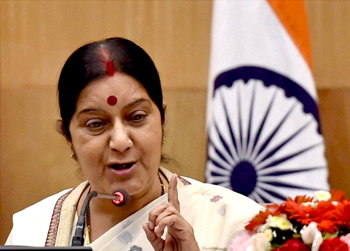New Delhi, Aug 23: The government on Monday asked stranded Indian workers in Saudi Arabia to return without waiting for unpaid salaries from their Saudi employers, indicating that negotiations to secure their dues had not made headway.

External Affairs Minister Sushma Swaraj used the social media to reach out to the affected Indian nationals asking them to return without “waiting indefinitely” for their dues.
“When [the] Saudi government settles with the companies which have been closed down, your dues will also be paid,” Ms. Swaraj said in a tweet.
The Minister-level declaration is the first sign that quiet diplomacy led by MoS Gen. (Retd.) V.K. Singh, to ensure dues and salaries for at least 3,172 workers who became jobless after three major Saudi construction firms folded up, did not yield results.
“Indian workers in Saudi Arabia – please file your claims and return home. We will bring you back free of charge. Please appreciate that settlement of claims will take time. There is no point in waiting there indefinitely,” Ms. Swaraj announced on her Twitter account. The announcement came even as Mr. Singh was in Saudi Arabia to seek settlement for the unpaid dues for the nationals.
The issue erupted on July 30 when External Affairs Minister announced from her Twitter handle that 10,000 Indian nationals were facing a “food crisis” in Saudi Arabia as they had not been paid salaries for several months. The crisis was due to non-payment of salaries for Indian nationals.
Subsequently, government sources had told The Hindu that the workers were to be evacuated even as the Consulate General in Jeddah and the Indian Embassy in Riyadh delivered food packets to feed hundreds of Indians.
A few days later, the government revised its estimate to declare that 3,172 workers were facing “distress” whereas 10,000 nationals “required assistance.”
However workers could not be evacuated quickly as most of them did not possess “no-objection certificates” from employing firms that had folded up and that apart they were also reluctant to leave without the “unpaid salaries.”
Medical aid
Following the Indian initiative, the Saudi government pitched in with food, medical and transport support for the jobless workers and promised to give “exit visas” to those without no-objection certificates.
However, MEA spokesperson Vikas Swarup had confirmed on August 19 that dues-related difficulties continued for Indian workers who were employed with Saudi Oger, Saudi Bin Laden and the Saad Group.
'No third option'
“The important thing to remember is, no third option is available to Indian workers belonging to these three companies,” Mr. Swarup said, asking the workers to opt either for repatriation or relocation to other companies.
Since the beginning of the crisis, two groups of workers were repatriated from Saudi Arabia amid signs that most of the workers were staying back seeking unpaid dues.
However, Ms. Swaraj's announcement on Monday indicates that the government would prefer the “jobless” workers to return after registering the claims — without any further assurances — with the Saudi authorities, as the companies that have ended operations are not in a position to pay the dues immediately.





Comments
Dear Sushmaji , what is your plan for Jobless people, to put as Cow Protector. Great Plan..........
Add new comment